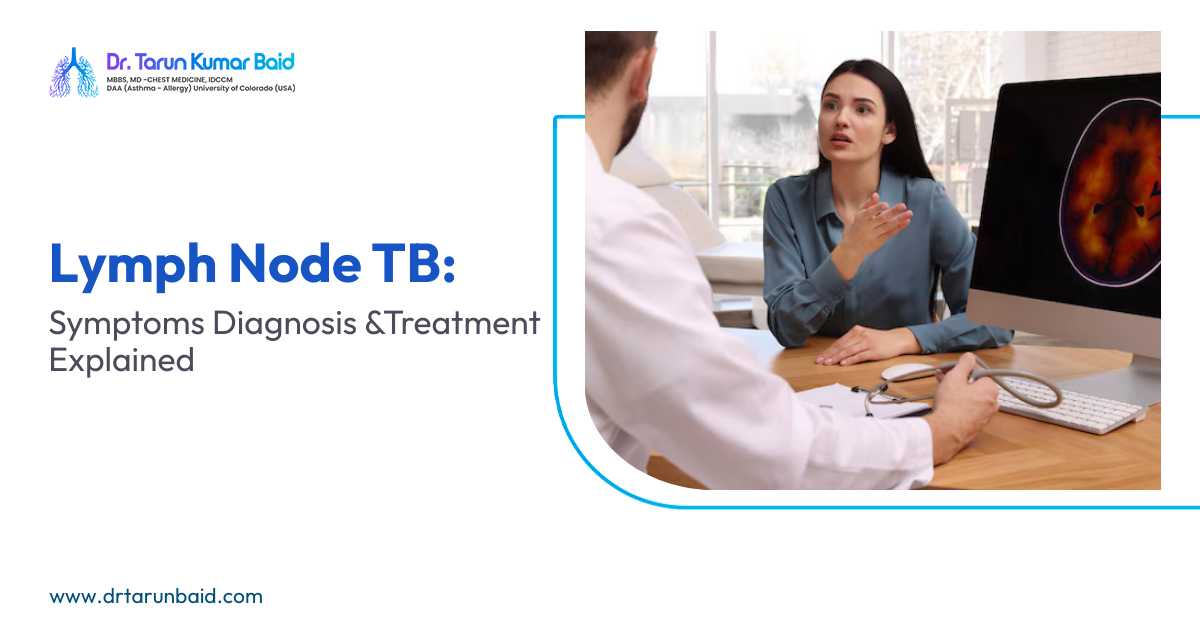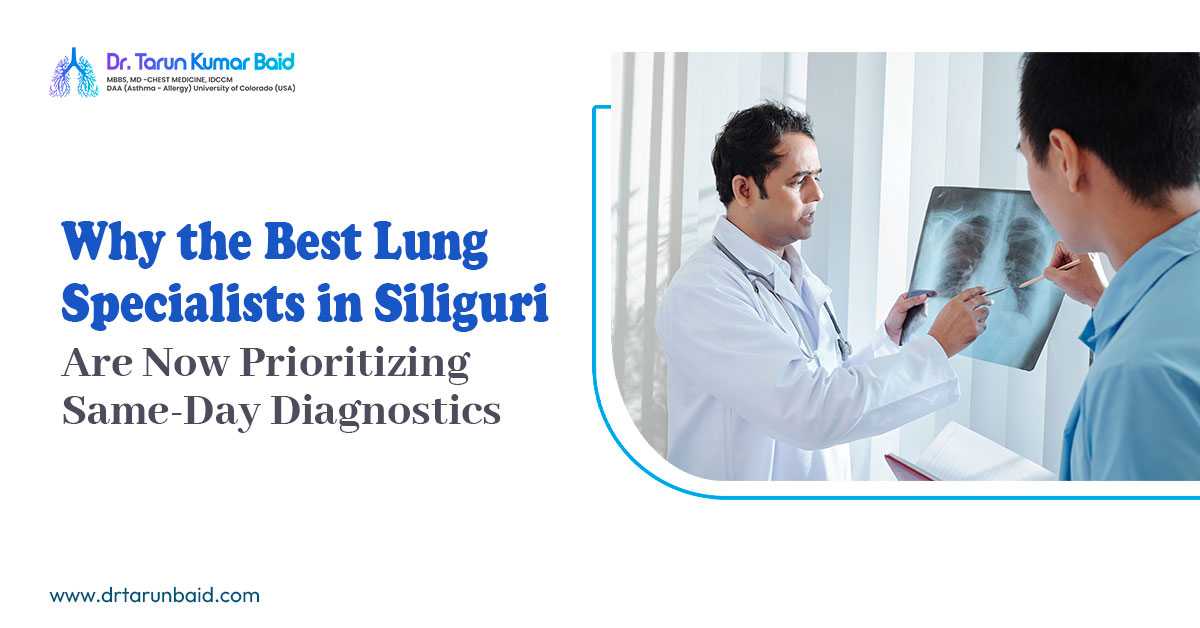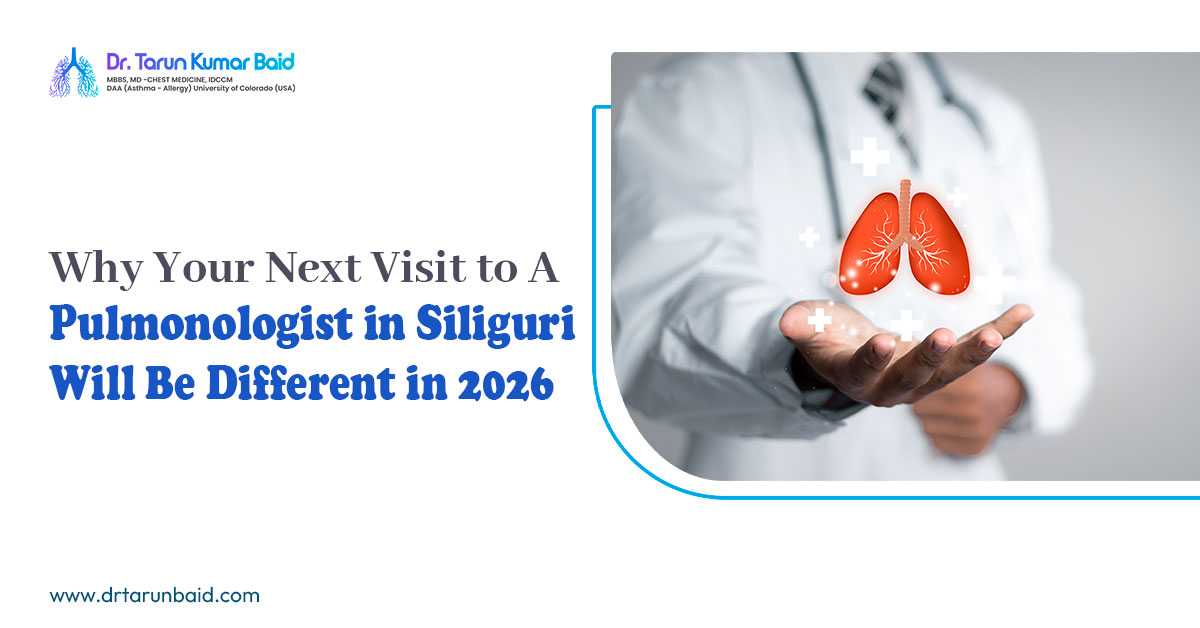What about experts whose area of expertise is the chest, lungs, and breathing? They are referred to as pulmonologists, respiratory medicine specialists, or chest specialists. Their role is essential not just in the event of severe lung disease but also in preserving your regular lung health, diagnosingproblems early, and offering treatment.
In simple terms, this blog outlines the importance of chest specialists, their duties, and when to consult one. For any type of lung health issues, you might speak with the top chest doctor in Siliguri, Dr. Tarun Kumar Baid, or a doctor near you.
Overview of a Chest Specialist
A physician who focuses on diagnosing, treating, and managing conditions affecting the lungs and respiratory system is known as a pulmonologist or chest specialist. This covers the lungs themselves, the airways, and the breathing muscles.
In order tounderstand how the lungs operate, how various illnesses affect breathing, and the best strategies for preserving and restoring healthy lung function, they receive years of specialized education that goes beyond basic medicine for the respiratory system.
When Should You See a Chest Specialist?
Because many people take symptoms lightly and think their symptoms will go away on their own, they delay seeing a chest specialist. Ignoring respiratory symptoms, however, might make a mild issue worse. Let’s know here’s when a pulmonologist should be consulted if you suffer from:
Coughing continuously for longer than three weeks
- Breathing difficulties or shortness of breath
- Noisy breathing or wheezing
- Pain in the chest, particularly during breathing
- Coughing up mucus or blood
- Recurring respiratory infections
- Fatigue that gets worse when you move
Getting assessed early helps identify underlying issues before they worsen, even if you don't have major symptoms.
Why You Should Take Care of Your Lungs
You must know that your body receives oxygen with each breath, which powers all of your organs and tissues. The body cannot obtain the oxygen it requires for survival if the lungs are not functioning properly.
We breathe roughly 23,000 times a day.Your body's cells receive oxygen from your breath. People are more likely to experience health issues when they don't get enough oxygen.
Unfortunately, smoking, pollution, infections, allergies, and even stress may easily impair your lung health. Exposure to certain triggers over time may result in damage or inflammation.
And this may lead to respiratory disorders that need medical attention. Now, chest specialists with their exclusive focus are on maintaining the health of your lungs and treating conditions that make breathing difficult. You might talk to the leading chest specialist in Siliguri or near you for an accurate diagnosis.
Respiratory Conditions Treated by Chest Specialists: What You Need to Know
Chest specialists treat a variety of respiratory disorders, and among the most common are:
- Asthma
The chronic respiratory illness known as asthma causes your airways to narrow and become irritated, making breathing difficult. A chest expert can give medication or inhalers, help you identify triggers, and teach you how to avoid attacks.
- Chronic Obstructive Pulmonary Disease (COPD)
The term COPD refers to a range of illnesses that impede airflow, such as emphysema and chronic bronchitis. To lower the disease's progression and enhance quality of life, chest specialists create individualized treatment regimens, and quitting smoking is a must.
- Pneumonia and Other Lung Infections
A chest expert ensures a precise diagnosis and efficient treatment to avoid further complications when you come down with a serious infection, such as pneumonia or tuberculosis.
- Interstitial Lung Disease
These conditions result in lung tissue scarring. This makes the lungs rigid and reduces oxygen exchange. A specialist's early action can stop irreparable harm caused by interstitial lung disease.
- Lung Cancer
Together with oncologists, chest specialists detect lung cancer and offer advanced care, such as imaging, biopsies, and pre-operative assessments.
- Sleep Apnea
Breathing repeatedly stops and starts as you sleep because of this condition. Thus, to identify the problem and suggest therapies like Continuous Positive Airway Pressure (CPAP) therapy, pulmonologists perform sleep studies.
- Occupational Lung Diseases and Allergies
Breathing problems are common in people exposed to industrial chemicals or allergies. Here,a chest specialist can determine the reason and offer strategies for reducing exposure and controlling symptoms.
Diagnostic Procedures Used by Chest Specialists
Advanced diagnostic tools are used by chest specialists to detect the underlying cause of these symptoms. Let’s know about the most popular tests:
- CT scans and chest X-rays: Provide fine-grained pictures of the lungs to identify structural problems, tumors, or infections.
- Pulmonary Function Tests (PFTs):The effectiveness of your lungs' airflow and oxygen transfer into your bloodstream is measured by pulmonary function tests, or PFTs.
- Bronchoscopy: A tiny camera is placed into the airways during a bronchoscopy to visually examine the lungs and, if necessary, take tissue samples.
- Blood tests and Allergy Tests: These can be used to detect infections or immunological reactions.
- Sleep studies: These are used in the diagnosis of disorders such as sleep apnea.
Overview of Treatment Options
Following a diagnosis, a chest specialist gives you a customized treatment plan that could include:
1. Medications
Depending on the disease, you can be prescribed bronchodilators, steroids, antibiotics, or inhalers to open up your airways, reduce inflammation, or clear infections.
2. Oxygen Therapy
Supplemental oxygen aids in maintaining a sufficient supply to the body for people with low oxygen levels.
3. Rehabilitation for Pulmonary Care
To increase lung function and endurance, this program combines breathing exercises, education, and physical activity.
4. Lifestyle Modifications
Chest specialistsoften advise patients to control their weight, stop smoking, and stay away from situations that exacerbate their symptoms.
5. Minimally Invasive or Surgical Procedures
Procedures like bronchoscopy or surgery may be advised in cases of malignancies, lung collapse, or severe COPD.
6. Extended Observation
Asthma and COPD are examples of chronic illnesses that need constant care. Now, treatment effectiveness is maintained with the support of routine follow-ups.
7. Smoking Cessation Programs
One of the most effective strategies to enhance lung health is to assist patients in giving up smoking.
8. Vaccinations
The risk of serious respiratory infections is decreased by the flu and pneumonia vaccines.
Final Words
Having healthy lungs is essential for all aspects of your life, including heart health, energy, sleep, and mental clarity. Besides treating illnesses, chest experts teach preventive care, help you live a healthy lifestyle, and provide emotional support while you heal. Meet the top chest doctor in Siliguri or at your location for optimum care and recovery.






